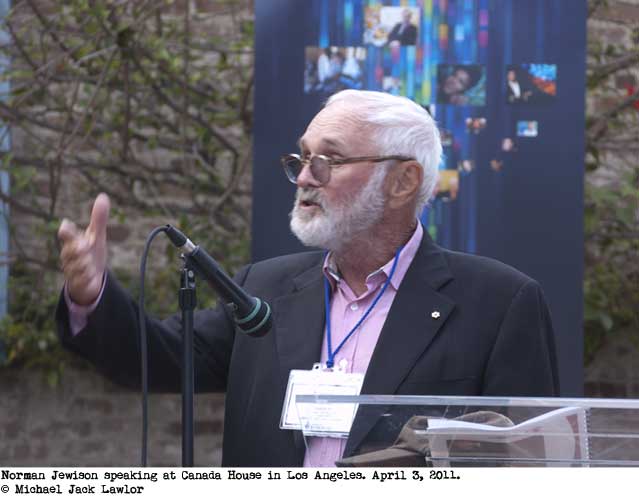

A few hundred alumni from the University of Toronto gathered around the swimming pool at Canada House in Los Angeles to celebrate the creation of the Norman Jewison Stream of Imagination and the Arts, an academic program at Victoria University in Toronto.
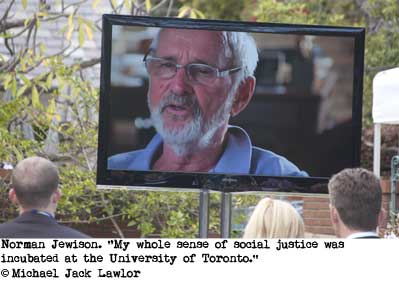 Norman Jewison, the Academy Award winning director of In the Heat of the Night, Jesus Christ Superstar, and The Hurricane, graduated from Victoria College in 1949.
Norman Jewison, the Academy Award winning director of In the Heat of the Night, Jesus Christ Superstar, and The Hurricane, graduated from Victoria College in 1949.
In video footage rendered on elevated screens, Jewison recalled that his “whole sense of social justice was incubated at the University of Toronto”.
Paul Gooch, Professor of Philosophy and President of Victoria, spoke about Norman Jewison’s commitment to social justice and how the Norman Jewison stream was designed to explore social justice and encourage creativity. The program derives its energy and vision from two academic courses: The Arts and Society and Artistic Creation and Public Issues.

In his autobiography, This Terrible Business Has Been Good to Me, Norman Jewison reveals that his sense of social justice emerged during a period of travel in the United States after the Second World War, before he enrolled at Victoria College.
Jewison was 19 years old, on leave from the Canadian Navy, and hitchhiking in the deep south. He was impressed by the hospitality of black people in Tennessee, Alabama, Mississippi, and Louisiana.
One day he took a seat at the back of a bus heading out of Memphis. The driver announced that the bus was not moving until Jewison changed his seat. A black passenger pointed to the sign: “Colored persons to the rear”. Jewison got off the bus.
“I think it was then, along the highways of Tennessee, Alabama, Mississippi, and Louisiana, that the desire to make films such as In the Heat of the Night and A Soldier’s Story took root … Racism and injustice are two themes I have come back to, again and again, in my films,” wrote Jewison.

A Canadian military band cranked out smooth jazz tunes as Jewison mingled with the poolside crowd. Dan Aykroyd, perilously close to the water, chatted with guests and posed for point-and-shoot photos.
Overdressed souls formed two solitudes on either side of the forgotten swimming pool. The dark suits and heavy dresses seemed funereal in the white California sunlight. Jewison’s baseball cap added a touch of mirth.
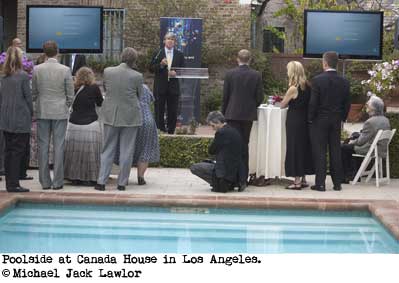
“Ah, dear father graybeard, lonely old courage-teacher, what America did you have when Charon quit poling his ferry and you got out on a smoking bank and stood watching the boat disappear on the black waters of Lethe?”
Chancellor David Peterson, former premier of Ontario, reminded everyone that Dan Ackroyd is not a graduate of the University of Toronto.
“I actually have the power to give Dan Ackroyd a degree, if he would come up and kiss my ring, which I keep in my back pocket. I want you to know the kind of power I have,” said Peterson.
The surface of the blue water rippled and cracked.
Peterson, not without a touch of magniloquence, told the expatriate crowd that the University of Toronto aspires “to make contributions in all corners of the world”.
The number of University of Toronto alumni living in the Los Angeles area is a mystery. The university does not “share” information about the brain drain. Yet, everybody knows that Canadians, like Mexicans, stream into California looking for work. Mexicans pick up the agricultural work that Americans won’t touch, while Canadians toil in the fields of entertainment, sports and technology.
In the late 50’s, Norman Jewison quit a secure job with CBC-TV in Toronto and moved to New York to direct television. In the early 60’s he moved to LA to direct movies.

A just society provides a basic social platform for all members. Everyone has access to education, health care, water and sanitation. Adversity is mitigated by a social safety net and laws are applied fairly, regardless of race, class and gender.
Social justice, the key to social stability and global prosperity, is achieved when human rights are secured for individuals by law. The goal of social justice is to create a diverse and equitable society.
Social justice expands and contracts as social pressures change: environmental pollution, dangerous financial products, crimes against humanity, immigration rights, health care, natural disasters, human migration.
Forget about charity on the smoking bank.
“Only a crisis produces real change. When that crisis occurs, the actions that are taken depend on the ideas that are lying around.”
The ideas “lying around” are always fire proof.
When the principles of social justice burn, societies become totalitarian. This can happen anywhere in the world.

Norman Jewison’s feel for social justice permeates his films.
“I have tended to show humanity as fallible, sensitive, befuddled, misled, but redeemable rather than mindlessly, relentlessly violent,” wrote Jewison.
In Rollerball he shows the connection between corporate culture, violence and profit. In F.I.S.T. he examines the betrayal of a labour union by it’s leader. …And Justice for All looks at how the search for truth in the American judicial system has been usurped by legal maneuvers and plea bargains. In The Hurrincane he dramatizes the life of Rubin Carter, a black boxer wrongfully convicted of murder. With In the Heat of the Night he explores racism in the southern United States.
“The whole idea of a class struggle, the excitement of worker solidarity against the oppression of capitalism, captured my imagination. No matter how naive or unsophisticated I was in 1948, these ideas influenced me in one way or another for the rest of my life,” he wrote.
Jewison was involved in many of the key social justice issues in North America during the second half of the 20th century, often putting himself at risk by speaking truth to power and participating in the civil rights movement.
In the mid 50’s he discovered that the McCarthy-era Hollywood blacklist had seeped into Canada. He hired Reuben Shipp, a writer from Montreal, to work on the The Barris Beat, a variety show he was directing for CBC. Shipp had been deported from the United States a few years earlier after refusing to testify before the House Un-American Activities Committee. Jewison was told by his Canadian employer to get rid of him.
“I told Rueben that he could keep writing, but his name would be changed on the credits. I felt angry and ashamed that the blacklist also existed in Canada,” wrote Jewison.
In the 50’s, Jewison obtained a green card and moved to New York to direct a variety show for CBS called Your Hit Parade. The weekly show featured America’s top ten hits. Lucky Strike Cigarettes was the sponsor.
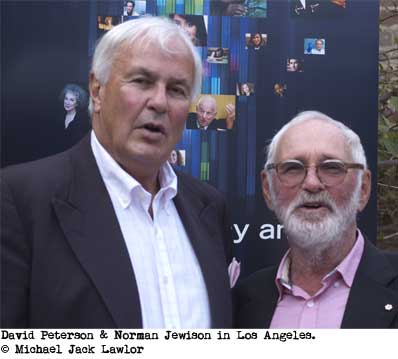
It’s All in the Game was creeping up the charts. Jewison scheduled the song for an upcoming segment, hoping it would reach the top ten. The singer, Tommy Edwards, was black.
Jewison was called into a meeting at an ad agency on Madison Ave where a Lucky Strike executive from North Carolina laid down the law: “we never had a black, and young fella, we ain’t about to start now”.
Jewison pointed out that Lucky Strike would not look good if a story about the companies anti-black policy were to appear in the New York Times. Tommy Edwards appeared on the show as scheduled and It’s All in the Game hit the top ten.
“The lesson, though I didn’t quite see it then, was to push back, to not let injustice persist, to understand that bigots often don’t like the light to shine in their dark corners,” wrote Jewison.
On New Years Eve, 1965 Jewison was introduced to John Wayne at a party in Newport Beach, California. Wayne starred at Jewison for an uncomfortably long time before shouting, “What are ya? One of those goddamn pinkos?”
Jewison attributed the wrath of John Wayne to the fact that he was the only guy at the Orange County party wearing a beard.
Bobby Kennedy encouraged Jewison to make In the Heat of the Night, assuring the Canadian director that the time was right for a movie about racial conflict in the U.S..
Kennedy’s instincts were right. In the Heat of the Night received six Academy Award nominations.
Dr Martin Luther King Jr was assassinated on April 4, 1968 and the Academy Award ceremony was postponed. Jewison joined Bobby Kennedy, Cesar Chavez, Harry Bellefonte, Sammy Davis Jr and hundreds of civil rights activists in Atlanta for Dr King’s funeral march. A few days later In the Heat of the Night won 5 Academy Awards, including best picture.
On June 4, 1968, Jewison, his wife, and Melina Mercouri – the Greek actress and political activist – were having dinner in a Chinese restaurant in Santa Monica. Later in the evening they planned to meet Bobby and Ethel Kennedy at director John Frankenheimer’s place in Malibu. The Kennedy’s were on the other side of town at the Ambassador Hotel, celebrating Bobby’s California primary victory.
Jewison watched the news of Bobby Kennedy’s assassination break on a TV in the restaurant bar.
After the assassinations of Martin Luther King and Bobby Kennedy, Jewison decided that he could not live in the United States any longer. He renounced his permanent residency status and moved to England.
“I did a stupid thing we all would later regret. I sent all four [green] cards back to the U.S. Department of Justice, informing them that we no longer wished to reside in their country. How stupid a protest was that? I later asked myself. My two boys never really forgave me,” wrote Jewison.
Jewison lived in LA with his wife and three children. What happened to the fifth green card?

Toronto used to be considered a city of neighborhoods in which the majority of people were middle class, but the fabric of the city has changed dramatically. Now geographers speak of three Toronto’s and the death of the neighborhood.
The first Toronto is primarily white. Lets call this downtown Toronto. People live close to subway stations, have access to social services and enjoy high incomes. Victoria University is downtown.
The second Toronto is physically close to the first but people have has less money. Many have been displaced from the downtown area due to rent increases and tax rates, but they do not live in poverty.
The third Toronto is populated by immigrants who live on very low incomes. Lets call this suburban Toronto. People living here have limited access to public transportation and job opportunities. A disproportionate number of Black and Chinese people live in suburban Toronto. Urban planners have warned that suburban Toronto is in danger of becoming a no-go zone, like the outskirts of Paris.
Tax relief, rent control, income supplements and transportation options would help immigrants living in suburban Toronto transition from objects of the city to subjects of the city.
Social justice transposes grammatical terms and liberates language. Characters speak differently in the final scene of a Norman Jewison movie than they did in the beginning.
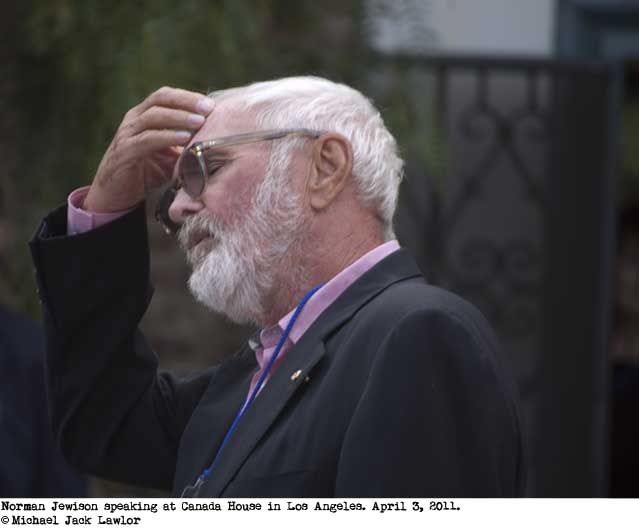


Norman Jewison talks about Victoria College
Norman Jewison talks about Bobby Kennedy
http://www.youtube.com/watch?v=I9AwjDlMNBI&
Listen to Allen Ginsberg read A Supermarket in California, the source for “Ah, dear father graybeard, lonely old courage-teacher, what America did you have when Charon quit poling his ferry and you got out on a smoking bank and stood watching the boat disappear on the black waters of Lethe?”
Read The Three Cities within Toronto.
Michael Jack Lawlor graduated from Victoria College in 1994 and moved to Los Angeles in 1999.




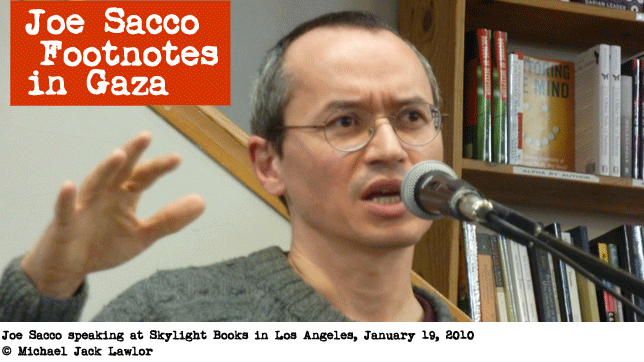
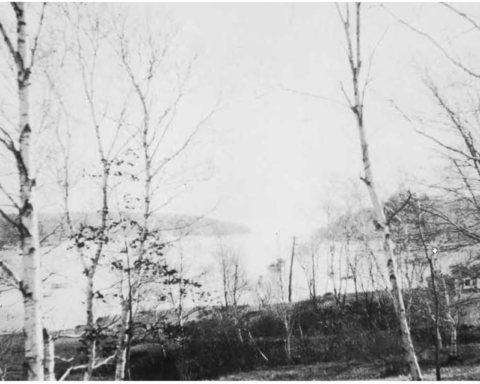
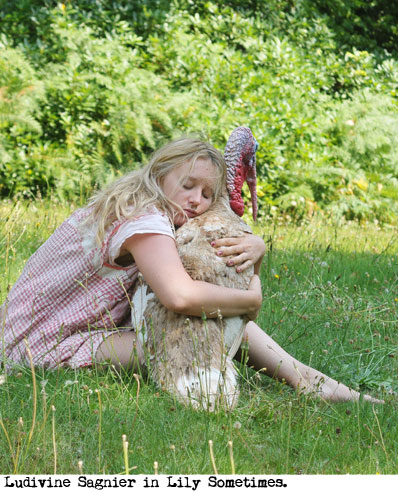
I must confess that Norman Jewison has been a name in the back of my head for a long time. I guess that at some point I was aware of his political/social stance. I do know that his art has had a positive effect on me. I am so pleased to have this article bring him into focus for me. Thank you. again you have written a clear and concise piece. Regards, Gregg